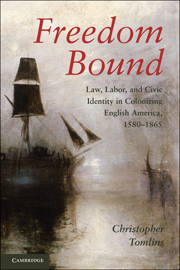Book contents
- Frontmatter
- Contents
- Tables and Figures
- Acknowledgments
- Freedom Bound
- Prologue Beginning
- Part I Manning, Planting, Keeping
- 1 Manning
- 2 Planting
- 3 Keeping (i)
- 4 Keeping (ii)
- Part II Poly-Olbion; or The Inside Narrative
- Part III “What, then, is the American, this new man?”
- Appendices to Chapter 1
- Index
- References
2 - Planting
“Directed and Conducted Thither”
Published online by Cambridge University Press: 05 June 2012
- Frontmatter
- Contents
- Tables and Figures
- Acknowledgments
- Freedom Bound
- Prologue Beginning
- Part I Manning, Planting, Keeping
- 1 Manning
- 2 Planting
- 3 Keeping (i)
- 4 Keeping (ii)
- Part II Poly-Olbion; or The Inside Narrative
- Part III “What, then, is the American, this new man?”
- Appendices to Chapter 1
- Index
- References
Summary
“It is not a kingdom without subjects and government.”
Bates’ Case (Exchequer 1606), Judgment of Baron ClarkTo examine the demographic history of early America is to discover certain abiding continuities. The first is the simple ubiquity of movements of population – whether indigenous, European, or African, whether transoceanic or intraregional, vast or small, voluntary or coerced – and an accompanying consciousness of movement. Second comes the equally ubiquitous phenomenon, among the introduced populations, of rapid growth. During the first two centuries, the non-indigenous peoples of the mainland English colonies grew from none to 2.7 million. Though rates of population growth varied across regions and periods, natural increase quickly outpaced increase attributable to immigration. From these facts of life one can identify a third continuity in the demographic history of English America, that from its inception its foundational reality was one of relentless expansion. Migration and natural increase transformed the first tattered enclaves of foreign strangers into teeming Creole populations, whose expansive mobility and incessant demand for productive land pressed unremittingly on indigenous inhabitants decimated by disease and warfare. According to the Shawnee people of the mid-eighteenth century Ohio Valley, the newcomers were “like Piggons.” Suffer but a pair to reside, “thayd Draw to them whole Troopes” and take all the land from its inhabitants.
The Shawnee experience was but one of many indigenous encounters with the physical, spatial expression of the “manning, planting and keeping” outlined by the elder Richard Hakluyt two centuries earlier. Collectively those encounters expose one of the deep connections between law and political economy upon which the process of colonizing depended for its dynamic; namely, the facilitation of transfer, the displacement of one population by another, through the agency of legal ideas and instrumentalities. Intermingled discourses – of sovereign jurisdiction over transoceanic territory and of the right to occupy and rule that territory so far as it should please the Crown to do so (the majestic claim of imperium and dominium); of civility in encounter with barbarity and of the justice of the wars that resulted; of rights of conquest, of occupation of vacant spaces, of title earned by use and improvement – all molded English possession and inhabitation of the mainland. Their deployment rendered law a principal technology for the colonizing project’s realization. Documents such as Crown letters patents (charters), agreements and treaties, imported practices such as tenures and deeds (the impedimenta of English land law, whether of the “feudal type,” or its modern contractual successors) together imposed a dense structure of both jurisdictional and substantive claims upon the North American landmass and its indigenous populations. Confronted by a later resort to such instrumentalities, the Tswana-speaking peoples of Southern Africa would aptly call law “the English mode of warfare.”
- Type
- Chapter
- Information
- Freedom BoundLaw, Labor, and Civic Identity in Colonizing English America, 1580–1865, pp. 67 - 92Publisher: Cambridge University PressPrint publication year: 2010



